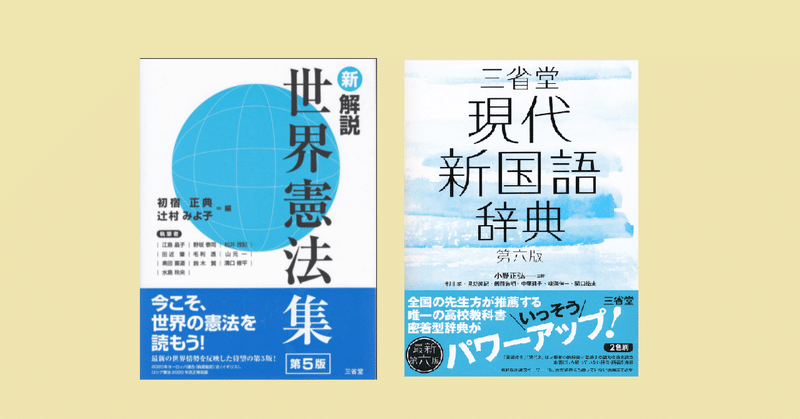
「勤労」に関する憲法の記述
「勤労」について、日本国憲法第27条は、以下のように記述しています。
すべて国民は、勤労の権利を有し、義務を負ふ。② 賃金、就業時間、休息その他の勤労条件に関する基準は、法律でこれを定める。③ 児童は、これを酷使してはならない。
ただし、日本国憲法に、「勤労」の定義はありません。そこで広辞苑 第五版(岩波書店、2002年)を見ると、こう書かれています。
①心身を労して勤めに励むこと。②一定の時間内に一定の労務に服すること
ここにある「勤め」については、広辞苑では「①つとめること。つとむべきこと」と書かれていて、堂々巡りです。そこで、現代新国語辞典(三省堂、2019年)をみると、下のように書かれています。
①いっしょうけんめい働くこと。②賃金をもらって、きまった時間、きまった仕事をすること。
この説明のほうがわかりやすいと思います。しかし、憲法の想定する「勤労」が①か②のどちらの意味を想定しているのかが不明なので、次に「国民」の定義を見てみましょう。国籍法は、出生による国籍の取得として、日本国民たる要件を以下のように定めています。
第二条 子は、次の場合には、日本国民とする。
一 出生の時に父又は母が日本国民であるとき。
二 出生前に死亡した父が死亡の時に日本国民であつたとき。
三 日本で生まれた場合において、父母がともに知れないとき、又は国籍を有しないとき。
つまり、ある人がこの条件にあてはまれば、生まれたときから死ぬまで、その人は日本国民ということです。そうすると、乳幼児も、アルバイトをしていない学生も、専業主婦も、賃金収入の得られない人も、日本国民に含まれることになります。
結局のところ、「すべて国民は、勤労の権利を有し、義務を負ふ」という条文が、実態に合っていないと思います。私は、憲法に従って勤労を始めたわけではないし、ほとんどの人もそうだろうと思います。ウィキペディアによると、「勤労の義務」が憲法に書かれた理由については、憲法成立当時の事情が関係していたようです。それについてさらに調べるのは時間がかかりそうなので、次に、他の国の憲法を見てみました。
インターネットで検索すると、「憲法に『勤労の義務』があるのは日本と北朝鮮くらい」という記事を見かけます。また、その記事に基づいたと思われるセリフを、小賢しい登場人物がはく漫画もあります(久米田康治「シブヤニアファミリー」少年サンデー2021年51号掲載)。しかし、憲法に『勤労の義務』を記述している国は、2カ国だけではありません。初宿正典、辻村みよ子『新解説世界憲法集 第五版』三省堂、2018年によると、中国は「労働」を義務とし、韓国は、「勤労」を義務としています。
中華人民共和国市民は、労働の権利及び義務を有する。「中華人民共和国憲法 第42条」
すべて国民は、勤労の権利を有する。国家は、社会的及び·経済的方法で、勤労者の雇用の増進及び適正賃金の保障に努めなければならず、法律の定めるところにより、最低賃金制を施行しなければならない。すべて国民は、勤労の義務を負う。国家は勤労の義務の内容及び条件を民主主義原則に従い法律でこれを定める。「大韓民国憲法 第32条」
なお、この記事によると、確かに朝鮮民主主義人民共和国憲法は、「労働」を神聖なる義務としています。
労働は,公民の神聖なる義務であり,栄誉である。「朝鮮民主主義人民共和国憲法 第83条」
中国、韓国、北朝鮮、そして日本という国々を考えると、共通点として儒教を連想します。しかし、儒教が、憲法の規定に関係しているかどうかは、わかりません。一方、『新解説世界憲法集 第五版』によると、ロシアの憲法では労働は自由だ、と書かれているそうです。
労働は自由である。各人は、自由に、自己の労働能力を使用し、仕事および職業を選択する権利を有する。「ロシア連邦憲法 第37条」
私には、こちらの方が至極まっとうな表現に思えます。
The Constitution's description of "work"
Article 27 of the Constitution of Japan describes "work" as follows
All people shall have the right and the obligation to work. Standards for wages, hours, rest and other working conditions shall be fixed by law. Children shall not be exploited.
However, there is no definition of "work" in the Constitution of Japan. So, looking at Kojien, 5th edition (Iwanami Shoten, 2002), it says
(1) To exert oneself physically and mentally in one's work. (2) To perform a certain amount of labor within a certain period of time.
Regarding "work" here, in Kojien, it is written as "(1) To work. What to work on", and it is a round trip. So, looking at the Modern New Japanese Dictionary (Sanseido, 2019), it is written as follows.
(1) Work hard. (2) Get paid and do a fixed job for a fixed time.
I think this explanation is easier to understand. However, it is unclear whether the constitution's "work" means (1) or (2), so let's look at the definition of "nation" next. The Nationality Law stipulates the following requirements for being a Japanese national to acquire nationality by birth.
Article 2 A child is a Japanese citizen in the following cases: (i) if the father or mother is a Japanese citizen at the time of birth; (ii) if the father died before the child's birth and was a Japanese citizen at the time of death; or (iii) if born in Japan and both of the parents are unknown or are without nationality.
In other words, if a person meets this requirement, he or she is a Japanese citizen from birth to death. Then, infants, students who do not have a part-time job, housewives, and people who cannot earn wages will be included in the Japanese population.
After all, I don't think the statement that "All people shall have the right and the obligation to work. " does not fit the reality. I didn't start working according to the Constitution, and I think most people do. According to Wikipedia, the reason why "obligation to work" was written in the Constitution seems to be related to the circumstances at the time of the Constitution's enactment. It will take time to find out more about it, so next I looked at the constitutions of other countries.
If you search on the Internet, you will find an article that says, "Only Japan and North Korea have a'work obligation'in the Constitution." There is also a manga with a smart-alecky character wearing lines that seem to be based on that article (Koji Kumeta "Shibuyania Family" Shonen Sunday 2021 No. 51).
However, the two countries are not the only countries that have a "duty to work" in their constitution. According to Masanori Shiyake, Miyoko Tsujimura, "New Commentary World Constitution Collection, 5th Edition", Sanseido, 2018, China and South Korea also make work a duty of the people.
Citizens of the People's Republic of China have the rights and obligations to work. "Constitution of the People's Republic of China, Article 42"
All citizens have the right to work. The State shall endeavor to increase the employment of workers and guarantee fair wages in social and economic ways, and shall enforce the minimum wage system as required by law. All citizens are obliged to work. The state stipulates the content and conditions of labor obligations by law in accordance with the principles of democracy. "Article 32 of the Constitution of South Korea"
According to this article, the Constitution of the Democratic People s Republic of Korea certainly makes "work" a sacred duty.
Work is a sacred duty and honor of citizens. "Constitution of the Democratic People's Republic of Korea, Article 83"
Considering the countries of China, South Korea, North Korea, and Japan, I think of Confucianism as a common point. However, it is unclear whether Confucianism is related to the provisions of the Constitution. On the other hand, according to the "New Commentary World Constitution Collection, 5th Edition", it is stated that labor is free under the Russian Constitution.
Labor is free. Each person has the right to freely use his or her work capacity and choose a job and profession. "Article 37 of the Constitution of the Russian Federation"
To me, this seems to be the most straightforward expression.
この記事が気に入ったらサポートをしてみませんか?
